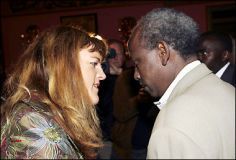International aid meeting for Sudan kicks off in Oslo
OSLO, Sept 27 (AFP) — Representatives of about 30 countries and international organisations met in Oslo to assess Sudan’s financial and humanitarian needs arising from two civil wars which have killed more than 1.5 million people.
 “The intention is mobilisation and preparation. Mobilisation in terms of humanitarian assistance for Darfur (and) preparation for the post-conflict phase for Sudan as a whole,” Norwegian Aid Minister Hilde Frafjord Johnson told reporters after opening the two-day conference.
“The intention is mobilisation and preparation. Mobilisation in terms of humanitarian assistance for Darfur (and) preparation for the post-conflict phase for Sudan as a whole,” Norwegian Aid Minister Hilde Frafjord Johnson told reporters after opening the two-day conference.
On the agenda for the representatives of Sudan’s main donor countries, rebel groups and the Sudanese government is the humanitarian crisis in the western province of Darfur and reconstruction efforts.
The meeting of senior officials will not result in pledges from donors. That step is expected to come at a later conference to be held once a comprehensive peace agreement for Sudan has been signed.
The first day of the Oslo conference was dedicated to talks on Darfur, where more than 50,000 people have died and 1.4 million have fled their homes amidst the pro-government Janjaweed militias’ scorched-earth campaign of ethnic cleansing against non-Arab minorities.
“There are no humanitarian solutions to humanitarian problems. Solutions will require dramatically improved political efforts,” Norwegian Undersecretary of State Vidar Helgesen said.
He said pressure must be maintained on Khartoum following a UN Security Council resolution adopted last week which warned Sudan of possible sanctions against its oil industry unless it protects the region’s population.
He said the pressure put on Khartoum so far was working, noting that the government had “not much breathing space now”.
“It is not only the government that will need to do its job but the government has clearly the burden of proof because they have been using delaying tactics and have a history of unfulfilled promises,” he said.
International aid agencies have voiced concern that instead of disarming and disbanding the Janjaweed, the government has been incorporating them into the regular forces, mainly the army and police, and assigning them to guard camps for displaced persons in Darfur.
The United States has accused Khartoum and its allied militias of genocide, but Sudan has rejected those claims and blamed in part the two rebel groups, the Justice and Equality Movement (JEM) and the Sudan Liberation Movement (SLM).
“The situation in Darfur has been dramatized to a great extent by the international media, to the extent that the rebel groups feel that they are immune to criticism, that they are not responsible for what’s happening,” the head of the government delegation, Yahia Hussein Babiker, said.
He insisted that the government was “doing its best to disarm all the rebel and bandits in the area, including the Janjaweed and others”.
But the international community still considers that Khartoum has not done enough to disarm the Arab militias.
The head of the SLM delegation, Ahmed Hussein, said he was in favour of enlarging the African Union contingent and extending its mission to protect the civilians, not just monitor a ceasefire reached in April but which has been violated numerous times since then.
The current mission consists of 133 observers on the ground protected by 300 soldiers.
But Helgesen rejected the idea of sending a peacekeeping force, saying there were not enough resources.
On Tuesday, delegates are scheduled to discuss reconstruction aid after a peace agreement has been reached to put an end to a 21-year-old civil war between the Arab-Muslim north of the country and the mainly Christian and animist south, which has killed more than 1.5 million people.
The Khartoum government and the Sudan People’s Liberation Movement/Army have already signed a number of peace agreements but they are now expected to sign an overall peace deal. Their talks resume in Nairobi on October 7.
